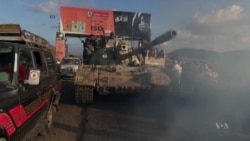Saudi Arabia unleashed multiple airstrikes in Yemen, the Saudi ambassador to the United States told reporters in Washington on Wednesday.
The envoy, Adel Al-Jubeir, said more than one city was targeted.
"We are determined to protect the legitimate government of Yemen," he said.
The ambassador said Riyadh consulted with the United States before launching the strikes, but it is not clear if the U.S. is playing any part.
Several other Gulf states also have joined in the military operation. Bahrain, Kuwait, Qatar and the United Arab Emirates issued a joint statement with the Saudis saying they are protecting Yemen against "Houthi aggression."
The attacks came after Yemen’s president sought safety Wednesday and rebels descended on the nation’s main port.
Neighboring Saudi Arabia has been watching closely, having moved troops and heavy weapons this week to areas along the Yemeni border.
Yemen had asked its Gulf neighbors to intervene against the Iran-backed Houthi rebels. Saudi’s foreign minister warned earlier that if the Houthi coup in Yemen does not end peacefully, the Kingdom is prepared to take “necessary” measures.
The Saudis had indicated that the border buildup was defensive.
But a U.S. government source said the Saudis were planning air strikes if the Houthis reach Aden, where ex-President Abd-Rabbu Mansour Hadi has been hiding since fleeing Sana’a last month.
There are reports the Houthis had advanced to within just miles of the southern port.
Analysts say Saudi Arabia's move to intervene could escalate the conflict into a regional battle.
“Iran is already helping the Houthis, and I expect Iran to ramp up support for its Yemen proxy,” said Max Abrahms, a professor of political science at Northeastern University and member at the Council of Foreign Relations. “Yemen is a sectarian tinderbox that will likely explode with international geopolitical repercussions.”
A sectarian civil war with external intervention will have repercussions, Abrahms said.
“The rational course of action is for Saudi Arabia and other leading Sunni countries to halt Iranian influence around the world,” he said. “Not because of the differences between Sunni and Shia Islam, but because of competing national interests and the geopolitical stakes.”
Earlier, some analysts predicted that it was not likely that Saudi Arabia would do much more than shore up its border.
“Although the Saudis have used an increasingly more dire - perhaps even bellicose - tone in their public statements about the violence in Yemen and what must be done to stop it, a military intervention would be incredibly risky,” said Fahad Nazer, a former political analyst at the Saudi Embassy in Washington.
Nazer said Sauda Arabia would need the support of other countries in the region. It was unclear if that happened Wednesday.
Other countries in the region may not have much appetite to go to war as the crisis does not impact them as strongly as it does the Saudi Kingdom, Nazer said.
“It is also important to note that the Saudis and other GCC states are already taking part in the US-led strikes against ISIS strongholds in Syria,” Nazer said. “Any additional military commitments could stretch their military forces thin.”
Perhaps most importantly, the Saudis face more than one adversary in Yemen, which is home to al Qaida in the Arabian Peninsula [AQAP] and, if their claims are true, the so-called Islamic State, which claimed responsibility for attacks on two mosques in the capital Sana’a a week ago.
With the air strikes, Saudi Arabia could find itself in a bind, analysts say.
“They would find it difficult to bomb Houthi rebels and let AQAP roam wild in the south,” Nazer said. “Targeting the Houthis and sparing AQAP would enhance the latter's position on the ground. Some Western and Middle East critics of Saudi foreign policy would likely frame such an attack as tacit support of AQAP.”
In the long term, Saudi Arabia is reported to be planning to build new military facilities, including a naval base at the Red Sea port of Jazan.









